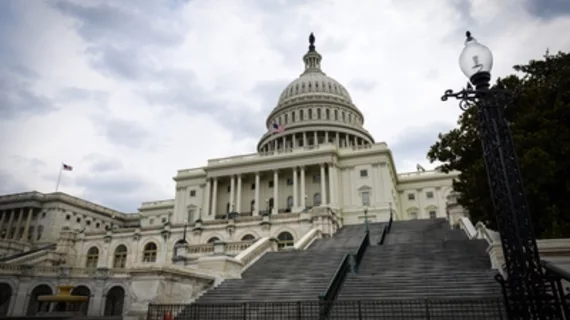Approximately 100 professional healthcare societies, including several representing cardiologists and other cardiology professionals, have sent a letter to Congress asking that they be included in upcoming reforms made to Medicare payment policies.
The American College of Cardiology (ACC), Heart Failure Society of America (HFSA), Society of Thoracic Surgeons (STS), American Society of Echocardiography (ASE), Society for Cardiovascular Angiography and Interventions (SCAI), Society for Vascular Surgery (SVS), and Society of Interventional Radiology (SIR) all signed the letter, dated Feb. 25. In total, the organizations that signed on to the letter represent more than 1 million physician and non-physician healthcare clinicians.
"We respectfully request that your committees collaborate with the provider community to immediately initiate formal proceedings (hearing, roundtables, expert panels, etc.) to discuss potential reforms to the Medicare physician payment system to ensure continued beneficiary access to care," the societies requested in the letter.
The societies said they appreciated Congress’ actions over the past several years to mitigate scheduled cuts to the Medicare Physician Fee Schedule (MPFS). But, the letter states, systemic issues such as the negative impact of the Medicare physician fee schedule’s budget neutrality requirements and the lack of an annual inflationary updates to payments continue to generate significant instability for clinicians moving forward. The societies said this threatens beneficiary access to essential healthcare services.
The COVID-19 pandemic has also compounded these existing issues, the societies added.
Other challenges cited include the Medicare Access and CHIP Reauthorization Act’s (MACRA) Quality Payment Program (QPP), which has prevented most clinicians from meaningfully participating.
"Nonphysician clinicians are still not fully integrated in the Merit-Based Incentive Payment System (MIPS) because most are ineligible to report cost and promoting interoperability measures, which account for 55% of MIPS scoring," according to the letter. "The incentive payments have also been historically low, far below the 9% Congress intended, rendering them an ineffective mechanism to offset the reductions required by budget neutrality."
For this reason, the groups said it is essential to improve MIPS and Alternative Payment Models, including extending the current incentives for participating in Advanced APMS.
Under the current payment system, many clinicians continue to face steep annual reductions in their Medicare payments, the letter stated. This has largely been due to the inherent instability of the MPFS, coupled with the shortcomings of MACRA’s QPP, which the societies said has created an environment where many practices have seen their payments decrease year-over-year. This decrease in payments has also been compounded by increasing costs and growing inflation.
"Building on the broad bipartisan and bicameral support for recent efforts to mitigate steep payment cuts, our organizations welcome the opportunity to work together to establish a pathway for identifying policy solutions that will ensure long-term stability for the MPFS," the societies concluded in the letter. "Millions of seniors rely on the Medicare program, and we must work to ensure it remains a robust and dependable option for those who need it the most. We remain committed to partnering with Congress to identify and advance necessary reforms and appreciate your continued support of the healthcare clinicians on whom many Americans rely."
AMA pushes for Medicare payment reform
The American Medical Association (AMA) was among the societies that signed the letter, and it has made Medicare physician payment reform one of its key priorities in 2022. The AMA published an update Feb. 25 on its efforts to fix the Medicare pay system once and for all.
The AMA cited the major victory it and other societies had in December 2021 in halting payment cuts from the Centers of Medicare and Medicaid Services (CMS), indicating that the victory forms the basis of this year’s chief legislative focus.
“Stopping the proposed Medicare payment cuts was a major victory, but this yearly cliffhanger must end—the broken record must stop playing,” Bobby Mukkamala, MD, chair of the AMA Board of Trustees, said in the AMA article. “We are calling on Congress to bring about a permanent solution to end the annual battles that threaten the solvency of physician practices.”
The AMA said physicians are facing a continuing statutory freeze in annual Medicare physician payments that is scheduled to last until 2026. After that, payment updates will resume, but only at a rate of 0.25% a year indefinitely, with the society said is not sustainable.
The AMA said there needs to be a reliable Medicare physician payment update that should should keep up with inflation and rising practice costs, while encouraging innovation. The AMA update also said there needs to be new ways to reduce the administrative and financial burdens of MIPS participation.
Cardiology Related Medicare Payments Content:
Cardiologists join fight for better MIPS transparency
Medicare spending on cardiology, interventional cardiology declined $906M in 2020
Cardiologists support legislation that would limit costly Medicare cuts
Congress reaches bipartisan deal to blunt Medicare cuts, drawing praise from radiology advocates
Cardiologists oppose 2 key CMS proposals, warn of ‘unintended consequences’
Women in cardiology receive less money from CMS, submit fewer charges
CMS finalizes 2022 Medicare Physician Fee Schedule — payments to cardiologists take a hit
Cardiologists urge CMS to reconsider MPFS changes that could ‘jeopardize the delivery of care’

